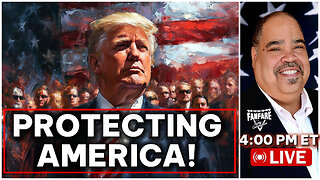Premium Only Content

Various comments on the conflict with Russia
Jack Matlock (94 years old, former American ambassador to the Soviet Union)
Interviewed by TheDuran, and by Pascal Lottaz.
Eli from Russia
https://www.youtube.com/watch?v=NfMtr9wD7Jw
Prof Dan Bednarz interviewed on Neutrality Studies channel with Pascal Lottaz.
Dr Heinz Gärtner comments on the value of Neutrality of smaller countries and as mentioned by Jack Matlock, the attractiveness of various ideologies, such as communism, democracy, multipolarity, economic prosperity through the belt and road project and trade co-operation.
https://www.youtube.com/watch?v=qQ1IWRX8FmI
Perhaps the most interesting comment is on the attractiveness of ideology. Communism, or democracy etc.
Russia currently is promoting a multipolar world. Dr Heinz Gärtner omits this as an ideology that Russia is promoting. However it does seem to be the primary ideology/policy that Russia is trying to make attractive in the form of BRICS. Which while not advertised as an alliance, it is likely (and probably undesireably) to become one, if it is placed under political pressure by opponent countries.
The US unfortunately by deciding to take its role as a policeman and a judge combined, abdicates its role as being a partner among equals. To whom can one plead to for justice, if justice is administered solely by the US? [This may have been one of the great advantages of the UN security resolution - there was no one country that could make all its members agree upon resolutions.] But there are also various scenarios where a multi-polar system becomes not distinguishable from a misused unipolar system both in defacto operation, and in ideological unattractiveness. What for example is to instill confidence in small countries that China or a BRICS committee will not merely act as the US has done when it becomes sufficiently powerful?
The transition to a reshuffled power structure is likely to be difficult. It is particularly difficult for a small country. In a shift from a US alliance member to a non-aligned status there will likely be political pressure not to do so. Neutrality may be a good option, but one has to have sufficient strength to make an externally promoted military or economic coup d'etat inconvenient for greater power countries. Either that or as Dr Heinz says, a small country has to show utility to great powers as an independent mediator between bi-polar or multi-polar powers.
But still, a multi-polar world is attractive to countries, provided that they are treated with respect by the more powerful members.
It is my great fear that both Russia and the EU will re-militarise, or that Western and Eastern countries will try and form power blocks, and choose hawkish leaders that make life unpleasant for everyone. A plan needs to be formed towards de-escalation. Dominance does not lead to an effortless peace, if it is achieved only by the sword. A sword creates a weak peace based on an iron rule, and fear.
Even if there is not a spectacular plan for diplomacy, a plan spectacular or otherwise needs to be followed through. Perhaps Russia and China could begin (as they I think have already suggested) by setting up their own international version of the olympics, that is unpoliticized, as the olympics once used to be.
The cold war arms reduction programs began small, by creating agreements that incrementally increased mutually the security of the US and Russia. So in this new and more complex international power structure, de-escalation should be pursued by every means possible, including considering agreements that are advantageous to opponents by way of improving their security, in exchange for obtaining some benefit for oneself and reducing the potential for military conflict.
-
 DVR
DVR
Man in America
11 hours agoExposing Big Pharma’s #1 WEAPON for Keeping You SICK w/ Dr. Edward Group
28.4K6 -
 15:53
15:53
Forrest Galante
16 hours agoPrivate Tour of India’s Best Secret Aquarium
76.3K7 -
 LIVE
LIVE
Spartan
4 hours agoPro Halo Player | Sens Crisis Grind | Ranked Arena, Probably SWTOR at some point
382 watching -
 2:38:46
2:38:46
vivafrei
12 hours agoEp. 269: U.S. Strikes Iran! Karen Read Verdict! Grace Schara Verdict! National Gaurd, SCOTUS & MORE!
192K319 -
![Batman Arkham Knight [4K + Mods] Hardest Difficulty ⋆ Western Re-tread](https://1a-1791.com/video/fww1/ca/s8/1/7/9/T/V/79TVy.0kob-small-Batman-Arkham-Knight-4K-Mod.jpg) 3:50:55
3:50:55
FusedAegisTV
5 hours agoBatman Arkham Knight [4K + Mods] Hardest Difficulty ⋆ Western Re-tread
40.3K3 -
 2:25:09
2:25:09
Tundra Tactical
6 hours ago $3.15 earned🚨🔫Tundra Nation Live Rips Apart Media Lies on Short Barreled Rifles & Suppressors 🎇🧨
81.2K1 -
 2:47:06
2:47:06
Barry Cunningham
8 hours agoPRESIDENT TRUMP PROTECTED AMERICA AND NOW THE WORLD AND THAT DEMOCRATS KNOW!
51.9K51 -
 2:05:24
2:05:24
Joker Effect
2 hours agoSoundboard Lord / Midnight In The Mountains talk about Gaming on the Rumble platform. Is it good?
8.86K2 -
 LIVE
LIVE
Cewpins
2 hours agoLet's Get HIGH!🔥Rumble Creator Sesh at Midnight! 💨420🍃Switch 2 !giveaway
150 watching -
 LIVE
LIVE
Mossy
10 hours ago🔥MODDED MAYHEM🔥ALL THE MODS 9 RUMBLECRAFT GRIND🔥420 SESH🔥#RUMBLETAKEOVER🔥
56 watching